Just in time for Black History Month, I offer a go-to cinematic resource for teaching or learning African American history without having to leave your couch.
With just a DVD player, a streaming service, a library card or a robust bootleg hook-up, you can begin the process of learning how 12% of the population got here, survived here, and continue to redefine their existence in 50 easy installments. I’ve broken it down chronologically by era so you get a real sense of history as it happened.
A few qualifiers:
1) This is a list of movies, not documentaries.
I attempted to make the list as accessible as possible. Sometimes access hinges on a decision to forego a lesson because your audience knows it’s a lesson. So I kept it, for lack of a better word, “theatrical.”
2) No movies with white protagonists as leads.
I may have squeezed a couple under the wire in the interest of exposing key historical information, but only because it was the only way to get at the historical merit a film might contain.
3) Movies listed can be had with minimal effort.
You won’t be required to dig out an obscure indie South African film from 1993 here (though one comes close). You can get most of these through a common streaming or rental service with little or no cost, or you can buy a copy for pretty cheap. If you had to rent every movie on here at $3 a pop, you’d be in the hole a piddling $150. At $150 it would still be the cheapest history course you’ve ever taken.
4) The film has to be historical ENOUGH.
Not all of the movies are ripped from the historical headlines. A few are based on fictional narratives. I include them here because theywere exemplary at exposing aspects of culture or eras in time that go otherwise unremarked by films.
Let’s do this:
BEFORE THE 19th and 20th CENTURIES
Africa
You can’t have an African American history list without at least a nod to Africa, so let’s get the bad news out of the way upfront: there is almost nothing to work with when it comes to Africa prior to slavery in film, particularly in English. I was willing to go subtitled on this era (something like Yeelen, though the metaphysical aspects scared me off of that limb) but I really wanted to stick to a list that almost anyone could step into if they were so inclined.
1) Roots 
The Black History Month fallback. Roots could conceivably get you through a couple of eras, but the first two episodes by themselves perform an as-good-as-we’re-likely-to-find job of capturing a slice of generalized African life leading directly into the process that would, quite literally, create African-Americans. Pop in the first couple of episodes and you’re on your way. While you’re at it, somebody call Vin Diesel and tell him to get that Hannibal movie done, stat.
Slavery
2) Sankofa 
When this came out in 1993 the Afrocentric movement and black cinema were peaking hard. Not that the filmmakers were aware of that, since this was a Burkina Faso-based production, but it’s interesting to note the tenor of the times for context. It is an ambitious film, and a rough ride as well, featuring numerous unflinching portrayals of slave abuse unmatched until 12 Years a Slave.
3) Nightjohn 
A pretty decent film based on a book whose theme about the power of literacy is profoundly captured here more than in other films of its ilk.
4) A Woman Called Moses 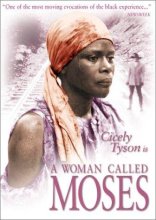
Cicely Tyson is the queen of black struggle movies, having featured in and won more awards than probably any actor in the genre. Seriously, she’s in almost half of these films. Harriet Tubman is a figure begging for an updated treatment, but in the meantime, you could do a lot worse than this.
5) Amistad 
This one comes perilously close to breaking my “no white leads” rule, save that it’s largely an ensemble piece. One of the few depictions of the Middle Passage on film.
6) 12 Years a Slave 
You already know. The most finely produced depiction of slavery to date. If we never made another one, we’d have this covered.
Civil War/Reconstruction
7) The Retrieval 
A surprisingly effective film capturing the socially gray period during which slaves who were slowly becoming a free people after the Civil War had to navigate a still hostile and treacherous America. I cannot recommend this one highly enough, especially since it’s a recent film (2013) that works really hard to get the era’s many dichotomies to the table, and because most people have never heard of it and it deserves to be seen.
8) Glory 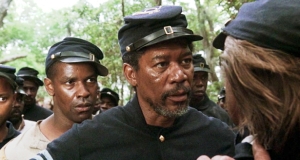
The Civil War fallback. A little too patriotic for most black folks’ taste in 2015, but if you want to see Morgan Freeman slap the slave back into Denzel Washington – and witness the birth of the thug tear – this is your movie.
9) Beloved 
Capturing any Toni Morrison novel to screen was always going to be tough, but this film at least does an admirable job of showcasing the horror of post-slavery’s not-so-post slavery.
10) Buffalo Soldiers 
It’s not just a Bob Marley song.
11) Buck and the Preacher 
Blacks in the Old West? YEAH RIGHT, SIDNEY POITIER. While veering from action to comedy in spots, this is one of the very few films to depict blacks in the west and their various relationships to, well, everything. We still need this historical hole filled better.
THE 20th CENTURY
1900s
12) Daughters of the Dust 
The very existence of this film is historical: it was the first film directed by a black woman that was distributed theatrically in the U.S., and you’d be hard-pressed to find another cinematic depiction of Gullah culture, let alone one that put the women up front in the story. Hasn’t been a film like it since.
13) Rosewood 
One of the most storied post-slavery massacres of black people in the U.S. gets the Hollywood treatment. Despite this fact, it remains a miracle that it ever saw the inside of a movie theater considering it’s basically a film about white people burning a black town to the ground. But then, you could still make a movie like that in 1997. Note: This is one of those films you have to watch at the end of the week because you will not want to be around white people after watching it.
14) 10,000 Black Men Named George 
As the 20th century unfolded, blacks began to organize in new ways. This film does an okay job telling the origin tale of one of the most keen organizers in the history of black American movements, A. Philip Randolph.
Jazz Age/ Harlem Renaissance
(Note: There isn’t even a bad film that quite captures black life in this era yet, so I had to stretch this one a lot.)
15) The Cotton Club 
This one has a SERIOUS asterisk on it.
For one, it firmly breaks my white protagonist rule almost entirely. Second, it’s The Cotton Club. Bear with me.
Of the media that captures black life during this time period, it mostly consists of gangster depictions (Hoodlum and Boardwalk Empire come to mind). If, however, you’re willing to dig through the gangster parts of The Cotton Club – both black and white – you’ll find some compelling slices of the black art life of the period. Just fast forward through all the scenes with white people in them and watch the five minutes of film left over.
16) The Josephine Baker Story 
While I tried to lean off of single-person narratives, this one helps round out the era artistically, and gives some insight into how racism affected even the parts of black culture the country enjoyed.
1930s
17) Roll of Thunder, Hear My Cry 
A film based on a book you used to have to read in school that was pretty deep once you got past it being homework.
18) Sounder 
Another bit of homework turned cinematic study, if you have to choose between this and Roll of Thunder, Hear My Cry, Sounder wins the popular vote, but Thunder has the better book.
19) The Color Purple 
There is nothing I can tell you about this film that you don’t already know, except for the people who keep thinking the story takes place during slavery for some idiotic reason. Extra credit: take a drink when you hear something a black person at your job says every day. By the end you’ll need a sponsor.
20) The Great Debaters 
While one must stay vigilant against historical narrative based on minimal evidence, I am a sucker for movies that capture slices of black life that go unsung and bring depth to the perception of our collective experience. A black debate team? Not a sports film? Denzel Washington? Do it.
World Wars Era
21) Men of Honor 
Solid enough mainstream offering that brings to the fore a military first you didn’t know about: the first black master diver and his many trials and tribulations.
22) The Tuskegee Airmen 
Skip Red Tails and go back to a still-perfectly-good film about the most heralded black soldiers ever.
23) A Soldier’s Story 
Not a true story, but an excellent look at the what was at stake for black people through the lens of the perceived humanity of our black soldiers.
24) Miss Evers’ Boys 
One of America’s dirtiest, darkest secrets – the Tuskegee syphilis Experiments – brought compellingly to light.
25) Miracle at St. Anna 
Buffalo Soldiers: The 1944 Remix.
Post-World Wars Era (1940s – 1960)
26) Something the Lord Made 
The former Mos Def displays some real acting chops as Vivien Thomas, who, despite having only a high school education, became a pioneering surgeon saving countless lives through his research and procedures. You need a PhD now to even be considered for what he was doing back then. The tools he needed to do cardiac surgeries didn’t exist at the time, so he CREATED THEM.
27) Round Midnight 
Europe in the 1950s was rife with black art expatriates, and this film gives more than the appropriate tip of the hat to the jazz giants who made it their home at the time. Filled to the brim with real jazz musicians playing real jazz (though the movie is co-led by a mopey white guy).
Civil Rights Era (1950s – 1960s)
28) Brother John 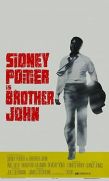
A pitch-perfect capture of Southern 60s political fears on both sides of the fence, Sidney Poitier turns in a simmering performance as a mysterious figure who returns to his hometown in the midst of near riot-level racial tensions, sparking all kinds of questions. (Personal aside: this is one of my favorite films of all time.)
29) Malcolm X 
I mean, come on.
30) The Women of Brewster Place 
What was at the time the most powerful conglomeration of black actresses in one shot, this ensemble piece brings to the table all kinds of topics: racial pride, sexual politics, class warfare…it’s got it all (albeit in primetime TV miniseries fashion).
31) For Us the Living: The Medgar Evers Story 
Because it wasn’t just Martin Luther King, Jr. versus Malcolm X for a decade.
32) Selma 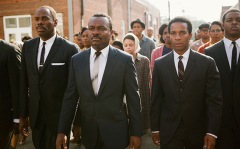
I used to use King (1978) here, but we have Selma now. Don’t let anyone scare you off of this because of the supposedly less than endearing portrayal of LBJ. The role of black people in their own liberation has been misrepresented by Hollywood so much people should be ashamed to mention it. (I’m looking at you, Mississippi Burning, which should have been on this list but isn’t because of significant White Protagonist Syndrome.)
33) Boycott 
Another King film, but focused almost entirely on how the bus boycotts got going.
34) The Butler 
I really didn’t want to include this film because (among other reasons) it tries to do too much historically and ends up spreading itself thin. That said, it does have a solid depiction of lunch counter activism, both in the training of protesters and in the depictions of the violence they encountered. You don’t see that a lot, and considering how often it comes up when schools try to teach this era, it was worth mentioning what it got right.
Post-Civil Rights Era (before 1980s)
35) Killer of Sheep 
An intensely non-narrative depiction of a Watts family struggle, this film is almost as notable for its production as its vision: it sat on a shelf for almost 30 years for to not having all of the music rights.
36) The Spook Who Sat By the Door 
Probably the most revolutionary black film ever, this title has the distinction of being pulled from theaters in less than a week for being too educational (understanding that the class in question is “Urban Guerilla Warfare 101”). If the penultimate American nightmare could be captured onto celluloid, it would be this movie.
37) Panther 
The Black Panthers go Hollywood. It goes a little too Hollywood to tell some sorely needed truths in parts, but the Panthers is a story worth telling again and again until we get it right.
38) Cornbread, Earl and Me 
How far back do you need to go to get some day-to-day police/black relations on the movie table in earnest? About 1975 (setting aside the “well-meaning” Sweet Sweetback’s Baadasssss Song for obvious reasons).
39) Good Fences 
Desegregation allowed blacks to enter into some interesting new spaces, not the least of which worth investigating was the suburbs. Danny Glover and Whoopi Goldberg reunite to give us a film that deconstructs what it really means to sell out.
1980s
(Note: You are about to get a lot of Spike Lee movies in your life. It’s almost like no one else was taking the black experience seriously in film but Spike, or that Hollywood would only accept those stories from Spike. That is, of course, a discussion all its own.)
40) She’s Gotta Have It 
Looking like a student film that got away, this film sets off black sexual identity in a way that hadn’t ever been captured earnestly in film. What’s equally interesting is the way Spike Lee looks back on aspects of this work now.
41) School Daze 
Considering black colleges and universities haven’t gotten a lot of cinematic shine since A Different World ended in 1993 outside of a Drumline or Stomp the Yard flick, this film opens up all kinds of worm cans and dumps the contents on the table. They’re not largely edible – School Daze works better as a conversation piece than a solution machine – but you got to give the young Spike Lee credit for trying.
1990s
42) Do the Right Thing 
Who knew this slice of life tour de force would turn out to be cinema’s most resounding warning shot about the black communities’ relationship with police brutality? Also covered: who gets to whup a child, gentrification, and the eternal love of Ruby Dee and Ossie Davis.
43) Menace II Society 
A nihilistic powerhouse of a film that’s basically Boyz N The Hood on steroids. Where Boyz strove to educate and preach, Menace opted to just scare America cold turkey off of black people.
44) Get On The Bus 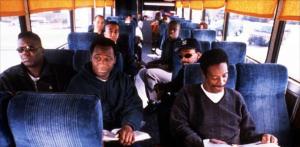
The historic Million Man March gets some love.
45) Higher Learning 
Blacks don’t get much play about how hard it is to navigate white colleges. Higher Learning gives us some insight here, though its theatrics jump the shark and Ice Cube begins to become a NW a little less A, which is a plus.
46) Bamboozled 
Lee strikes again, this time with a hardcore satire of black perception as generated by entertainment. If you ever needed to school someone on the problem with blackface, cooning and slave memorabilia, this is your flick (if you can get past the unnecessary voice affectation Damon Wayans puts on here).
POST 20th CENTURY
2000s
47) Precious 
The nihilism I talked about in Menace II Society? Still on blast in the 2000s, and unapologetically brought to life in this book-to-film about a young lady in the ghetto trying to survive despite every hurdle in the book. Unlike Menace, you get some insight into how the system works against people. Also unlike Menace, women with personalities exist.
48) Fruitvale Station 
Before Ferguson there was Oscar Grant III. The police have become the number one issue in black communities in 2014, but the signs have been on the wall for generations. This movie was a critical darling, even while the issues it raised remain dismissed by the power structure of America.
49) Pariah 
When it comes to LGBT issues, the black community remains largely conservative (read “closed-minded”). This film does a great job highlighting the difficulty in coming out against that prejudice.
50) Dear White People 
School Daze circa 2014. The more things change, the more they don’t. Not just a commentary on blacks and college life, and despite its title, not just about what white people do wrong.
IN CONCLUSION
One of the takeaways in compiling this list was the sinking realization of how far we still have to go in recording black history in ways that engage people beyond the little that we must be “required” to know. Left to evaluate the extent of black contributions to American history by what we are taught in school, one might write-off the record of the African American as a five-minute slave-to-civil rights pipeline unit in class. What Americans need to know about black people as an educational standard shrinks every year, which is sad since the baseline is already so low. Even with well over 100 hours of viewing there is a lot of history missing here, such is the depth and range of black contributions to the American experiment.
I offer that as both qualifier and challenge.

SOLDER STORY IS SO FUCKING GOOD I HAVE TO SAY IT IN ALL CAPS! It’s like Rashomon plus Critical Race Theory.
Reblogged this on AfrocentriqueAZ and commented:
It’s almost February y’all!
Thank you for this post. I have found and requested/reserved from the library the following titles from your list: “Roots” ; “Nightjohn”; “12 Years a Slave”; “Glory”; “Rosewood”; and “The Color Purple”. The energy, personality and knowledge that you put into this compilation is much appreciated.
Ah… and “Pariah”. Very much looking forward to viewing all of these movies, but this one in particular.
Great List! I would probably replace Menace II Society with Boyz in the Hood, only because it shows both sides of living in the hood, and you gotta admit, Furious Styles was dropping real knowledge, but other than that, this is an excellent list that I will definitely share on my blog, Snowflakes in My Afro or http://www.snowinmyfro.com
Thank you for sharing!
Goodbye Uncle Tom deserves an Honorable Mention.
Claudine
What about the movies;
Mandingo, Honeysuckle Rose, Honey Bee. Made before 1979 with New Orleans touch of music. About some talented black people in Racist times
Do you know of any organizations that may have an interest in screening the documentary about John Roland Redd, an African American who reinvented himself as a musician from India.
http://www.atlasobscura.com/articles/how-a-black-man-from-missouri-passed-as-an-indian-pop-star
John
510 5242550
This is something I would love to no more.
Just watched Mississippi Burning… a great civil rights movie that I watched when it it first came out. I disagree that it depicts black people as cowards or complacent. The truth seems to be that they had to worry…about our families or the reality of living there long after the FBI left. Get real on that!
I’m trying to remember another movie that had flames, fire, or burning in the title and depicted the use of fire hoses on sidewalks to keep people down. Probably from the 70.s or 80’s.. Any ideas?
Great analysis of films about the African American experience.
Thank you…Hidden Figures is a new good one for the ages
You all should be a shame of you all selves for leaving out the movie,Race To Freedom:The Underground Railroad.It is as good as any you all top50.
I teach history through film. Thank you so much for this list
I promise to do an update soon!